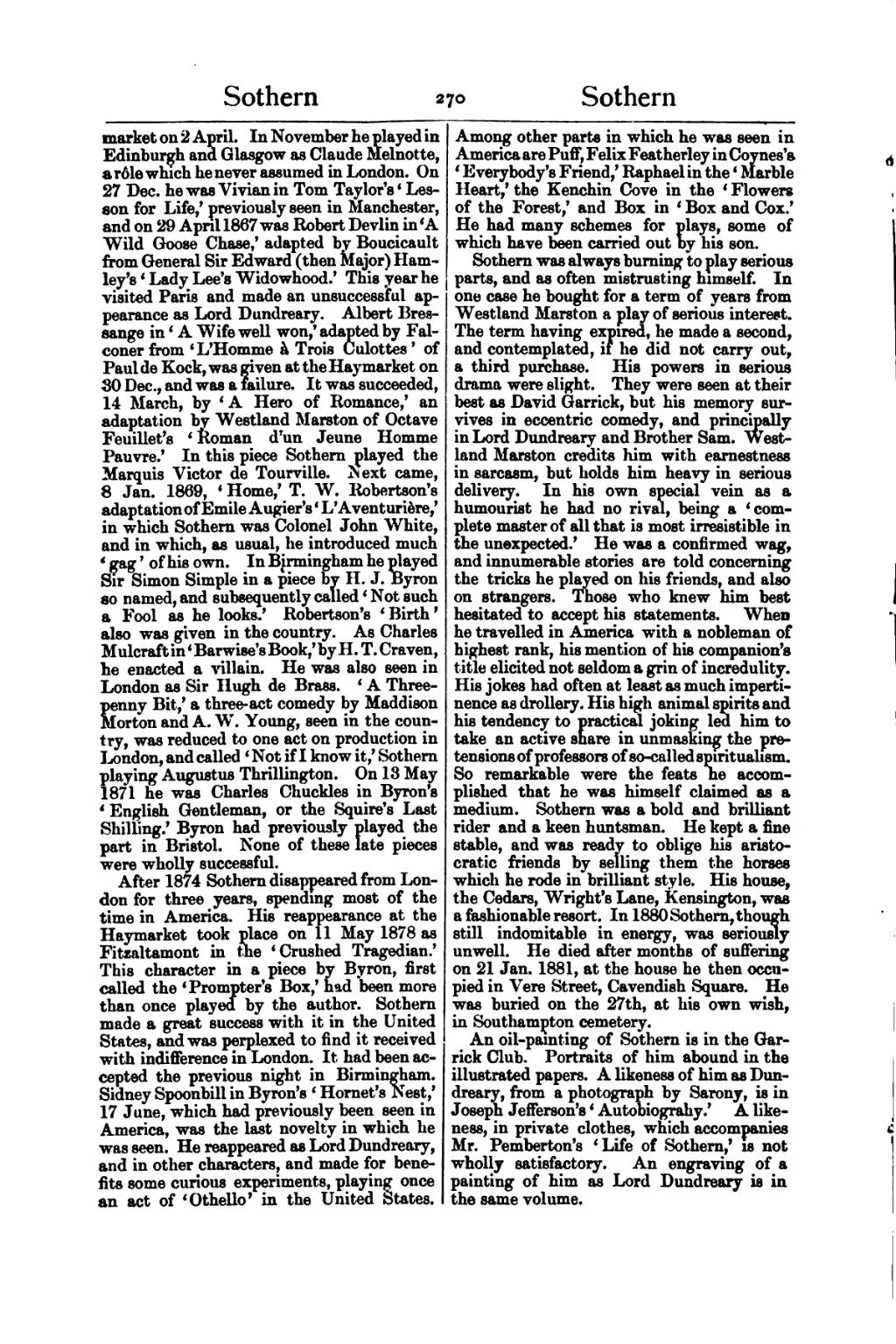market on 2 April. In November he played in Edinburgh and Glasgow as Claude Melnotte, a rôle which he never assumed in London. On 27 Dec. he was Vivian in Tom Taylor's ‘Lesson for Life,’ previously seen in Manchester, and on 29 April 1867 was Robert Devlin in ‘A Wild Goose Chase,’ adapted by Boucicault from General Sir Edward (then Major) Hamley's ‘Lady Lee's Widowhood.’ This year he visited Paris and made an unsuccessful appearance as Lord Dundreary. Albert Bressange in ‘A Wife well won,’ adapted by Falconer from ‘L'Homme à Trois Culottes’ of Paul de Kock, was given at the Haymarket on 30 Dec., and was a failure. It was succeeded, 14 March, by ‘A Hero of Romance,’ an adaptation by Westland Marston of Octave Feuillet's ‘Roman d'un Jeune Homme Pauvre.’ In this piece Sothern played the Marquis Victor de Tourville. Next came, 8 Jan. 1869, ‘Home,’ T. W. Robertson's adaptation of Emile Augier's ‘L'Aventurière,’ in which Sothern was Colonel John White, and in which, as usual, he introduced much ‘gag’ of his own. In Birmingham he played Sir Simon Simple in a piece by H. J. Byron so named, and subsequently called ‘Not such a Fool as he looks.’ Robertson's ‘Birth’ also was given in the country. As Charles Mulcraft in ‘Barwise's Book,’ by H. T. Craven, he enacted a villain. He was also seen in London as Sir Hugh de Brass. ‘A Three-penny Bit,’ a three-act comedy by Maddison Morton and A. W. Young, seen in the country, was reduced to one act on production in London, and called ‘Not if I know it,’ Sothern playing Augustus Thrillington. On 13 May 1871 he was Charles Chuckles in Byron's ‘English Gentleman, or the Squire's Last Shilling.’ Byron had previously played the part in Bristol. None of these late pieces were wholly successful.
After 1874 Sothern disappeared from London for three years, spending most of the time in America. His reappearance at the Haymarket took place on 11 May 1878 as Fitzaltamont in the ‘Crushed Tragedian.’ This character in a piece by Byron, first called the ‘Prompter's Box,’ had been more than once played by the author. Sothern made a great success with it in the United States, and was perplexed to find it received with indifference in London. It had been accepted the previous night in Birmingham. Sidney Spoonbill in Byron's ‘Hornet's Nest,’ 17 June, which had previously been seen in America, was the last novelty in which he was seen. He reappeared as Lord Dundreary, and in other characters, and made for benefits some curious experiments, playing once an act of ‘Othello’ in the United States. Among other parts in which he was seen in America are Puff, Felix Featherley in Coynes's ‘Everybody's Friend,’ Raphael in the ‘Marble Heart,’ the Kenchin Cove in the ‘Flowers of the Forest,’ and Box in ‘Box and Cox.’ He had many schemes for plays, some of which have been carried out by his son.
Sothern was always burning to play serious parts, and as often mistrusting himself. In one case he bought for a term of years from Westland Marston a play of serious interest. The term having expired, he made a second, and contemplated, if he did not carry out, a third purchase. His powers in serious drama were slight. They were seen at their best as David Garrick, but his memory survives in eccentric comedy, and principally in Lord Dundreary and Brother Sam. Westland Marston credits him with earnestness in sarcasm, but holds him heavy in serious delivery. In his own special vein as a humourist he had no rival, being a ‘complete master of all that is most irresistible in the unexpected.’ He was a confirmed wag, and innumerable stories are told concerning the tricks he played on his friends, and also on strangers. Those who knew him best hesitated to accept his statements. When he travelled in America with a nobleman of highest rank, his mention of his companion's title elicited not seldom a grin of incredulity. His jokes had often at least as much impertinence as drollery. His high animal spirits and his tendency to practical joking led him to take an active share in unmasking the pretensions of professors of so-called spiritualism. So remarkable were the feats he accomplished that he was himself claimed as a medium. Sothern was a bold and brilliant rider and a keen huntsman. He kept a fine stable, and was ready to oblige his aristocratic friends by selling them the horses which he rode in brilliant style. His house, the Cedars, Wright's Lane, Kensington, was a fashionable resort. In 1880 Sothern, though still indomitable in energy, was seriously unwell. He died after months of suffering on 21 Jan. 1881, at the house he then occupied in Vere Street, Cavendish Square. He was buried on the 27th, at his own wish, in Southampton cemetery.
An oil-painting of Sothern is in the Garrick Club. Portraits of him abound in the illustrated papers. A likeness of him as Dundreary, from a photograph by Sarony, is in Joseph Jefferson's ‘Autobiograhy.’ A likeness in private clothes, which accompanies Mr. Pemberton's ‘Life of Sothern,’ is not wholly satisfactory. An engraving of a painting of him as Lord Dundreary is in the same volume.
